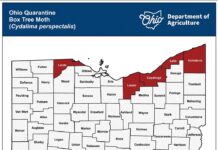SALEM, Ohio – If you own the land, you have a property right to the water beneath it.
According to a recent judgment by the Ohio Supreme Court, Ohio landowners have a property right in the groundwater under their land and the government cannot violate that right without providing compensation.
In a unanimous ruling, the court said government interference with the right to groundwater can qualify as the “taking” of property, which means property owners are entitled to compensation if the “taking” inhibits an owner’s use and enjoyment of his or her home.
No water. The ruling came after homeowners in two locations claimed their private wells dried up as a result of pubic works projects aimed at meeting the water and sewer systems needs of nearby cities.
In Wayne County, landowners near Sterling found their wells dried up after the city of Rittman, which is located 10 miles away, purchased land in the area and installed a well field. The well field pumped 500,000-750,000 gallons of water out of a local aquifer every day for city residents, according to the case summary from the Ohio Supreme Court.
In northeast Franklin County, wells belonging to several residents failed when the city of Columbus lowered the groundwater table to excavate for an extension of the city’s water and sewer lines.
Both groups sued their respective cities, but failed to recover damages in state court. According to the case summary, the trial courts found municipalities cannot be held responsible when the action that causes damage is authorized by law or necessary to the exercise of power of the political subdivision.
Appeal. The residents then took their cases to federal court, continuing to claim that diverting groundwater from their land without compensation was an unconstitutional taking of property.
The Franklin County case was heard by the U.S. District Court of Southern Ohio, which determined the groundwater could not be taken unless the state recognized the homeowners’ rights to it. The court found a homeowner’s rights to groundwater had not previously been recognized by Ohio courts.
The Wayne County case was heard by the U.S. District Court for Northern Ohio, which said the plaintiffs did not take action within the two-year statute of limitation.
The two groups appealed their cases to the U.S. Sixth Circuit Court, which consolidated the cases. The Sixth Circuit asked the Ohio Supreme Court to decide whether Ohio law recognizes homeowners’ rights to the water under their property.
The state Supreme Court found the right to groundwater does exist and governmental interference can be considered as the taking of property.
Use and enjoyment. Although neither city touched property belonging to the plaintiffs, the actions of the municipalities infringed on the homeowners’ rights to use and enjoy their homes, according to Steven Edwards, the attorney representing the homeowners.
“Even though they [the cities] weren’t technically trespassing, they took my clients’ property interest in the groundwater,” he said.
While the water table in Franklin County was eventually restored to its original status, Edwards said the dirt was compacted from the excavation and permanently interrupted the flow of water in the area.
The case is not over, but Edwards said this ruling will boost the level of protection for homeowners.
“Everybody in Ohio who depends on a well for their groundwater has some security and protection they never had before,” he said.
The Ohio Farmers Union filed a legal brief in the court case supporting the rights of farmers and rural landowners.
“Our position was that any company can do what they want, as long as they don’t deny a pre-existing farm from its water,” said Joe Logan, union president.
Keep it fair. Logan said the ruling could make it more difficult for an extremely large farm operation to set up shop, but added it’s only fair for new entities to make restitution if their routine affects groundwater in the area.
“We’ve come to think of water as kind of a freebie and it’s really not,” Logan said. “I think it’s going to put Ohio in a situation that’s more like our surrounding states” and make us think about water a resource.
Patricia Delaney, assistant city attorney for Columbus, said the ruling will make it more expensive for cities to grow.
“I just look at it as a cost increase now,” she said, adding that cities without a plentiful water supply will be the most deeply affected.
Farm Bureau Director of Local Affairs Larry Gearhardt said the ruling will help protect rural landowners.
“It is a monumental decision and one that is certainly well received by our members,” he said.
History. Writing for the court, Justice Paul E. Pfeifer said Ohio law regarding groundwater ownership was previously based on an 1861 ruling stating each landowner had total ownership of the water under his land, regardless of how nearby landowners were affected by the use of that water.
In 1984, the court adopted a “reasonable use” standard, restricting groundwater rights to the point where landowners could not exceed a sensible share of the water supply. The standard also gave property owners a method of action against anyone who unreasonably interferes with their property right to groundwater.
In applying the reasonable use standard in the context of local government, Pfeifer wrote Ohio law does not require a property owner to prove legal ownership of the water itself in order to claim compensation.
Edwards said he expects both cases to return to federal district courts for trial.
(Reporter Janelle Skrinjar welcomes feedback by phone at 800-837-3419, ext. 22, or by e-mail at jskrinjar@farmanddairy.com.)
Get 4 Weeks of Farm and Dairy Home Delivered










